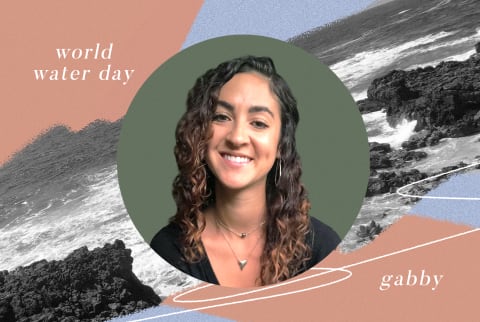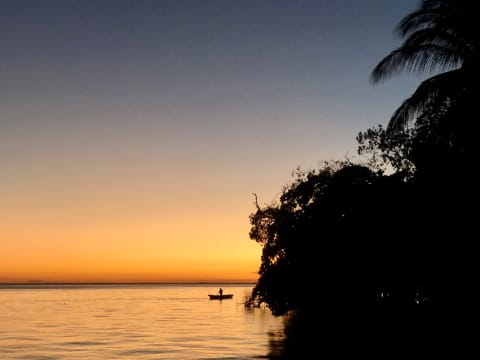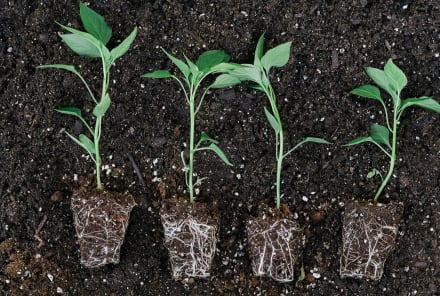Advertisement
Why This Marine Scientist Wants Us To See The Ocean As Human


As a young girl, I was infatuated with the mysteries of the deep sea, the wonder of the abyss.
I grew up in the desert, so this was a bit odd and unexpected. But in some ways, the depths of the ocean actually reminded me of life in the desert: quiet, harsh, and home only to those who can adapt and be strategic.
Like many young marine scientists, I was inspired by early ocean explorers like Jacques Piccard and Don Walsh and their fearless expeditions in the Trieste. Pioneers like Jacques Yves Cousteau, with his wise words that "people protect what they love" shaped how I began to observe the marine ecosystem.
I knew from a young age that I loved the ocean and wanted to protect it. And I felt like I had an opportunity in this world to make others do the same. So I decided I was going to do just that.
Diving deeper into the water's mysteries.
By the end of my undergraduate degree, I was doing research on the human impacts on coral reefs in Bonaire, a small island in the Caribbean. I graduated as the first marine and conservation biology study at my university and decided to attend graduate school in the next year.
I was very much an ecologist at heart, and I distanced myself from any kind of social science at the time. I'll admit that I ignorantly blamed humans for everything wrong in the ocean, and I set out to be a marine scientist to protect the ocean and the ocean only.
In my master's, though, I was challenged to think more holistically about the oceans and their dependent communities. For the first time, I focused more on the communities and less on the fish.
I became aware of how marine resource degradation negatively affects coastal communities in developing counties, threatening their livelihoods and food security. As I learned about the human rights abuses and labor violations running rampant in the fishing industry, I couldn't ignore the social justice issues and inequities present in marine conservation any longer.
I quickly turned into a marine scientist who wanted to protect people, too.
How conserving marine life can also conserve human rights.
Now, as a doctoral student, my work is focused on advancing human and labor rights in the seafood industry.
We have found ourselves in a reality in which the very nature of our globalized seafood industry has created an environment wherein workers on vessels are faced with modern slavery, trafficking, and exploitation. Violations like discrimination and food and livelihood insecurity occur frequently in coastal fisheries1. These violations are fueled by greed and corruption but also a global demand for cheap seafood.
As we overfish and exploit marine resources, it further exacerbates these issues. We cannot address the major threats the ocean faces today without fiercely addressing the social challenges present.
The marine conservation community has caught on to this and pivoted to explore innovative solutions to address human rights. But the work is far from over. Realizing an equitable seafood industry in which people and the planet are protected will require tides of change from government, large enterprises, organizations, and consumers.
We cannot address the major threats the ocean faces today without fiercely addressing the social challenges present.
While tackling human rights abuses does not solely fall on each of us, we have a responsibility to support this important work in the ways we can. First, learn about social issues in the seafood industry. If you are lucky enough to live near the coast, support your local fisheries. Be responsible consumers and learn about where your seafood comes from, and if you can, purchase seafood that is certified, such as FairTrade. Continue to be a steward of the earth. And perhaps most importantly, be an advocate for equity and social justice for all.
We each have the right to enjoy the ocean's abundance and experience its wonders. I ask each of you to think deeply about your relationship with the natural environment, the ocean, and even one another.
The ocean affects every single one of us...every day.
We are an ocean planet. It is our life source. Around the world, more than 3 billion people depend on the ocean and its resources for their livelihoods. Marine fisheries alone directly and indirectly support 880 million people, the majority of whom live in developing countries.
For these individuals, the ocean is more than something to explore or a childhood dream. Instead, it defines their cultures, social structures, and well-being. A sustainable ocean future is an equitable one, in which the marine environment is protected and all individuals can continue to benefit from its resources in conditions of freedom and dignity.

For some, the ocean is a place of mystery and a privileged opportunity for exploration. For others, it is a career, a calling. But more than anything, for countless people around the world, the ocean is a source of life, security, health, and the very foundation of what makes us human.
Our ocean is human. It is time we protect people and the planet.











